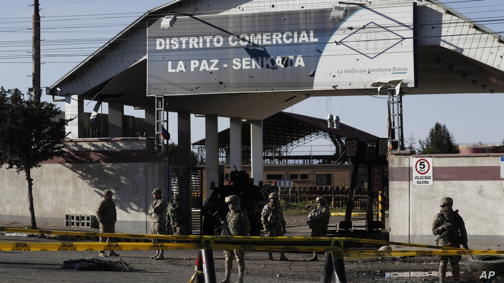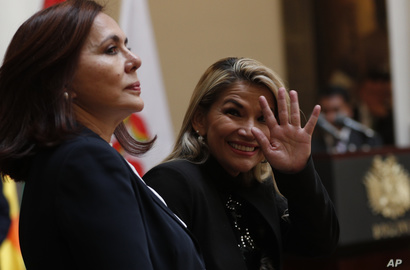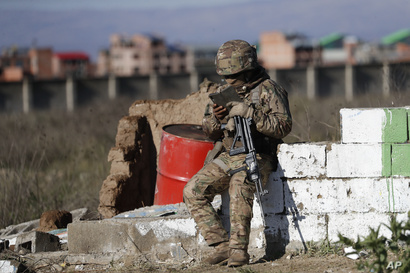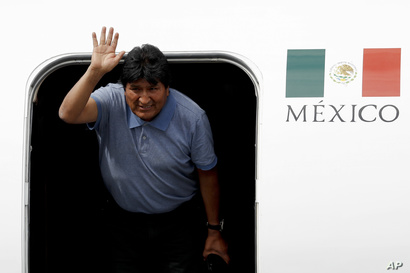
(above) Soldiers guard the Senkata fuel plant in El Alto, Bolivia, Nov. 22, 2019. At least eight people were killed Nov. 19 when police and soldiers cleared a blockade at the plant by supporters of former President Evo Morales.
Bolivian Government's Response to Protests Raises Human Rights Concerns
November 22, 2019 - Original article: VOA News
By Michael Rummel
Protests continue in Bolivia as human rights organizations raise concerns over reports of the use excessive force by security forces.
The popular upheaval began following the disputed election of Oct. 20 which, according to official results, long-time President Evo Morales won with a margin large enough to avoid a run-off. The Organization of American States (OAS) cited a pause in returns as suspicious, and claimed the results as fraudulent.
Soon after, protesters took to the streets calling for new elections. Morales, initially defiant, resigned under pressure from the military after agreeing to hold new elections.
(Below) Accompanied by Bolivia’s Foreign Minister Karen Longaric, interim President Jeanine Anez waves to journalists during a protocol greeting of ambassadors in Boliivia, Nov. 22, 2019.

Morales fled to Mexico soon after, and the leaders of his Movement for Socialism (MAS) party in Congress resigned as well. This flurry of departures left opposition Deputy Vice President Jeanine Anez next in line for the Presidency.
Anez took the mantle quickly. Soon after her swearing in, she appointed a full Cabinet, notable for its conservative outlook and exclusion of indigenous people.
Morales' left-leaning government has been in power since 2005, and its coalition draws significantly on Bolivia's indigenous population.
In conjunction with the new Cabinet, Anez issued Decree 4078, giving the armed forces amnesty from criminal prosecution for actions taken for the security of the state, drawing concern from Human Rights Watch and Amnesty International.
Human rights groups say Anez's administration is also looking to chill dissent in other forms. The new minister of government, Arturo Murillo, threatened jail for any person who commits sedition, a broad legal term meant to silence criticism.
The targets of the new government extend all the way to the top. According to a release from Human Rights Watch, Murillo threatened to "hunt down" former minister Juan Ramon Quintana.
Anez's incoming Communications Minister Roxana Lizarraga is extending similar threats to journalists.
Lizaragga claimed the government is willing to charge journalists, including foreign ones, with similar charges of sedition. In Bolivia, sedition carries up to three years in jail, and foreign journalists would be subject to deportation if convicted.
The implications of the decree and government focus on restoring stability' are already being seen.
(below) A soldier guarding the Senkata fuel plant reads from a mobile device, in El Alto, Bolivia, Nov. 22, 2019.

The OAS reports that more than 30 protesters have already been killed, with hundreds more injured. Most of the recent deaths and injuries are of Morales' supporters, who took to the streets after Morales fled to Mexico for asylum.
The last deaths came after security forces opened fire on protesters who were blocking access to a fuel depot. Eight were killed, and many more were injured.
Protesters have been attempting to deprive the capital, El Alto, of food and fuel.
Police on Thursday then dispersed a protest carrying coffins to symbolize the dead with tear gas.
These events have led to calls from Amnesty International for full investigations of the deaths. María José Veramendi Villa, South America researcher for Amnesty International, views these developments as "risky signals" for the human rights situation in the country.
These threats against human rights and freedom of expression, however, are not new, according to Veramendi.
Before his resignation, rights groups say Morales "threatened to fence' cities where there were demonstrations" about the disputed elections. Morales' former defense minister, Javier Zavaleta, also "justified the use of dynamite by groups of miners" against the protesters.
The U.S. State Department is monitoring the situation, and a spokesperson called on the Bolivian Government to "ensure … the rights of peaceful protesters," which includes "accountability for any violations" of their rights.
(below) Former Bolivian President Eva Morales waves upon arrival to Mexico City, Nov. 12, 2019. Mexico granted asylum to Morales, who resigned on Nov. 10 under mounting pressure from the military and the public.

Interim President Jeanine Anez submitted a bill to the Bolivian Congress to set a date and logistics for a new set of elections. Leaders in the Movement Towards Socialism Party are also supporting new elections, and party leaders told reporters they will not be presenting Evo Morales as a candidate.
Morales may complicate the situation. In previous days he has stated an intent to serve out his term, and implied that the Bolivian Congress can annul his resignation.
Morales, however, does remain popular among broad swaths of the population. Experts say economic revival lifted many out of extreme poverty, and he has overseen significant development in indigenous majority areas.
If he refuses to step aside, there could be far more unrest to come.